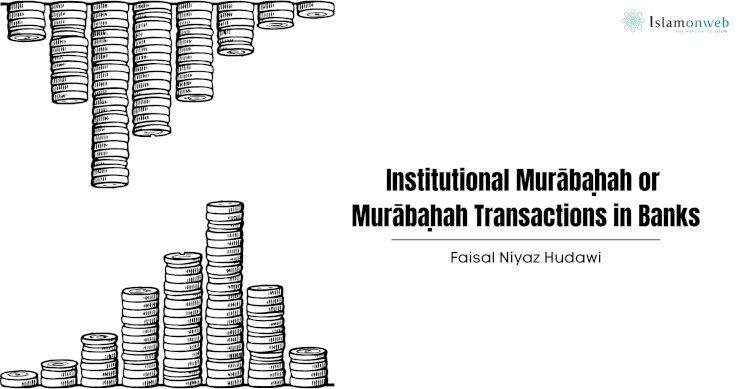Institutional Murābaḥah or Murābaḥah Transactions in Banks
In the realm of Islamic banking, Murābaḥah (cost-plus sale) is one of the most widely employed modes of financing. Islamic banks use this method primarily to help their clients acquire specific products or assets—most notably vehicles and other personal goods. In the retail banking sector, a significant portion of transactions is conducted through this form of sale.
However, the Murābaḥah practised in Islamic banks differs from the simple form of Murābaḥah discussed earlier. In this institutional version, the client first approaches the bank, expressing the need for a particular product and declaring readiness to purchase it from the bank at an agreed, deferred price that includes profit. Based on this arrangement, the bank purchases the asset and then sells it to the client.
To illustrate, suppose Aḥmad approaches a bank expressing his desire to purchase a car worth 100,000 dirhams. He informs the bank that if the bank purchases the car from the dealer, he is willing to buy it from the bank with a 10% profit margin and signs a promise of purchase to that effect.
Accordingly, the bank buys the car from the dealer and then sells it to Aḥmad through a new transaction, adding its 10% profit to the original purchase cost and clearly specifying the final price. Aḥmad agrees to pay this amount in instalments over a fixed period.
Since the bank undertakes this transaction in response to Aḥmad’s request, scholars have debated whether such an arrangement falls under the category of two sales in one—which is prohibited in Islam—or whether it resembles an interest-based transaction. However, the predominant juristic opinion maintains that, if conducted in accordance with prescribed conditions, this form of Murābaḥah is valid.
Classical juristic works, including Imām al-Shāfiʿī’s al-Umm[1], contain discussions of this type of sale transaction, providing the foundational framework for its permissibility under certain guidelines.
If a person shows an item to another and says, “Buy this, and I will give you a profit on it,” and the second person then purchases it, the first transaction (the purchase made by the second person) is valid. The one who initially offered to buy it with profit may either proceed with the purchase or choose to withdraw.
Imām al-Shāfiʿī further explains that this same rule applies even when the item requested is not specifically identified. Whether the subsequent sale takes place for cash (spot payment) or through a deferred payment arrangement with a fixed term, the same principle remains applicable.
However, if the promise and the purchase are executed within a single combined transaction—that is, if the promise to buy and the act of buying are tied together as one inseparable agreement—then such a contract is invalid according to Imām al-Shāfiʿī.
Based on this reasoning, a Murābaḥah transaction in which the initial promise to purchase is non-binding, even if the profit margin is pre-agreed, is considered permissible according to the Shāfiʿī, Ḥanafī, and Ḥanbalī schools of law[2].
In practical application, if the bank purchases the product but the customer later withdraws from the purchase promise, the bank may safeguard itself from potential loss by including a condition known as Khayār al-Sharṭ—a contractual clause allowing either party to revoke the sale within a specified period.
Key Conditions in Murābaḥah-based Banking Transactions
Thus, in a Murābaḥah transaction of this kind, the following points must be carefully observed:
- The Initial Promise:
The promise made initially between the bank and the client must remain a non-binding promise (waʿd). It should not, by itself, become a concluded sale contract. The Murābaḥah sale agreement should only be signed after the bank has purchased the item in question. - Ownership and Possession:
The bank must first purchase the product requested by the client from the dealer, take possession (qabḍ) of it, and bring it under the bank’s responsibility before executing the Murābaḥah sale with the client.
The bank cannot sell the item to the client before its purchase from the dealer is complete.
According to the Shāfiʿī school[3], if the bank sells the product after finalising its purchase but before taking possession, the transaction is invalid.
The Ḥanafī school permits[4] the sale of real estate before possession, while the Mālikī school allows[5] the sale of all non-measured and non-weighed commodities (other than food items) before taking possession. - Genuine Transactions, Not Paper-based Deals:
The transaction should involve a real purchase and sale, not a mere paper arrangement. The bank must actually buy the product from the dealer, then conclude a new sale with the client, and remain liable (ḍamān) for the item until it is delivered.
This means that if the item is damaged before delivery, the loss is borne by the bank, since the responsibility rests with it until the transaction is completed and ownership is transferred.
The bank cannot shift this liability to the client before the conclusion of the sale. - No Dual Agency:
The client must not act as both the agent of the bank and the buyer in the same transaction—receiving the product from the dealer on behalf of the bank and then handing it over to himself as the buyer. Such an arrangement compromises the integrity of ownership transfer and is not permissible. - Transfer of Ownership Through a New Contract:
The ownership of the product must be transferred to the client only through a new and independent contract (ʿaqd). Based on the earlier promise, the client may either proceed with the purchase or withdraw from it; however, fulfilling one’s promise is undoubtedly preferable.
This transaction may take the form of a Murābaḥah sale, where the cost and profit are clearly stated, or a Musāwamah sale, where a single agreed price is fixed without cost disclosure. - Compliance with Sharīʿah Rules of Sale:
All legal conditions governing sale contracts—such as the legitimacy of the subject matter, the eligibility of the contracting parties, the clarity of the price, the valid execution of the contract, and the actual delivery and possession of the sold item—must be observed.
When conducted in accordance with these principles, the above-mentioned transaction is deemed valid and Sharīʿah-compliant.
In Murābaḥah contracts undertaken by banks, the sale price is usually paid in instalments by the client. The total price varies depending on the number of instalments and the payment period agreed upon.
There is no difference of opinion among scholars regarding the permissibility of setting a deferred payment period for such sales. This practice dates back to the time of the Prophet ﷺ himself.
Imām al-Bukhārī narrates[6] in his Ṣaḥīḥ that at the time of the Prophet’s passing, his armour was pledged as collateral to a Jewish man in exchange for thirty sāʿ (approximately 80 litres) of barley, which the Prophet ﷺ had purchased on credit.
Based on numerous evidence of this kind, jurists (fuqahāʾ) affirm that it is permissible to fix a deferred payment period for the sale price—whether it is to be paid in a single lump sum or through multiple installments[7]. Islamic jurisprudence also recognises that the price may vary depending on the length of the payment period[8]; a longer term may justifiably entail a higher price, provided the terms are clear at the time of contract.
However, both the number of instalments and the corresponding sale price must be clearly determined at the time the contract is concluded[9]. Once the sale has been finalised, it is not permissible to increase the price or to leave the amount uncertain.
In other words, the contracting parties must first agree precisely on the payment schedule and the total sale price, and these details must be explicitly incorporated into the Murābaḥah contract.
Key Considerations in Deferred Payment (Taqsīṭ) Sales
When a sale is conducted on an instalment or deferred payment basis, certain essential rules must be observed to ensure Sharīʿah compliance:
- Clarity of Price and Payment Term:
The price and the payment period must be clearly specified at the time of contracting.
It is not permissible to conclude the transaction in an uncertain manner such as saying, “If paid in cash, the price is this much; but if paid in instalments, it will be that much.”
Rather, the sale must be finalised on one definite price — for example, “I sell this to you for this amount.”
Failure to do so renders the sale invalid, as it would then resemble “two sales in one,”[10] a form of transaction explicitly prohibited by the Prophet ﷺ. - No Price Change or Additional Charges After Sale:
Once the sale has been concluded, it is not permissible to alter the price — whether by increasing it or imposing any additional charge due to delay in payment.
Any amount demanded beyond the agreed price constitutes riba (interest). This is because, once the sale is completed, the remaining amount becomes a debt (dayn) owed to the seller, and any increment over that fixed debt is treated as interest.
It is natural for people to ask: “Aren’t Islamic bank Murābaḥah transactions the same as conventional loan financing?” Although they may appear similar on the surface, there are fundamental differences between them.
In conventional banking, the transaction is purely a loan contract, and the additional charge is interest on money lent.
In Islamic banking, Murābaḥah is a sale contract, not a loan.
Hence, the legal framework and liabilities that arise differ completely.
For instance, in a Murābaḥah sale, if the sold item has a defect that affects its usability or value, the seller (bank) is responsible to take it back or compensate the buyer.
Even for a short period, from the time the bank purchases the product until it is delivered to the client, the responsibility and risk of ownership (ḍamān) rest entirely with the financing institution.
After the sale is concluded, the price in a Murābaḥah transaction cannot be modified.
In contrast, interest-based loans often accumulate interest, compound interest, fines, and penalties over time.
If a client fails to pay an instalment on time, imposing fines or additional fees is not permissible in Murābaḥah-based financing.
Some Islamic banks, however, include a charity clause, stipulating that clients who delay payments must contribute a certain amount to charitable funds.
This measure is intended as a deterrent rather than a profit mechanism.
Yet, the majority of scholars hold that even such a clause is not legally enforceable, since it resembles a conditional penalty tied to debt — something Sharīʿah does not recognize as binding.
Notes:
[1] Al-Shāfiʿī, al-Umm, vol. 3, p. 39.
[2] Al-Sarakhsī, al-Mabsūṭ, vol. 30, pp. 237–238, Ibn al-Qayyim, Iʿlām al-Muwaqqiʿīn ʿan Rabb al-ʿĀlamīn, vol. 4, p. 23
[3] Ibn Ḥajar al-Haytamī, Tuḥfat al-Muḥtāj bi-Sharḥ al-Minhāj, vol. 4, p. 401
[4] Al-Sarakhsī, al-Mabsūṭ, vol. 13, p. 9., Al-Kāsānī, Badāʾiʿ al-Ṣanāʾiʿ fī Tartīb al-Sharāʾiʿ, vol. 5, p. 181
[5] Ibn Rushd, Bidāyat al-Mujtahid wa-Nihāyat al-Muqtaṣid, vol. 7, p. 230.
[6] Āʾishah (raḍiyallāhu ʿanhā), Ṣaḥīḥ al-Bukhārī, ḥadīth no. 2916
[7] Al-Māwardī, al-Ḥāwī al-Kabīr, vol. 7, p. 322, Ibn al-Mundhir, al-Ijmāʿ, p. 119
[8] Ibn al-Rifʿah, Kifāyat al-Nabīh fī Sharḥ al-Tanbīh, vol. 9, p. 348, Al-Kharshī, Maʿālim al-Qurb fī Sharḥ Mukhtaṣar Khalīl, p. 134, Zakariyyā al-Anṣārī, Fatḥ al-Wahhāb bi-Sharḥ Manhaj al-Ṭullāb, vol. 1, p. 210, Ibn Ḥajar al-Haytamī, Tuḥfat al-Muḥtāj bi-Sharḥ al-Minhāj, vol. 4, p. 433, Al-Khaṭīb al-Shirbīnī, al-Iqnāʿ fī Ḥall Alfāẓ Abī Shujāʿ, vol. 2, p. 337, Al-Sarakhsī, al-Mabsūṭ, vol. 13, p. 78, Al-ʿAlīsh al-Mālikī, Manh al-Jalīl ʿalā Mukhtaṣar Khalīl, vol. 5, p. 272, Ibn Qudāmah, al-Mughnī, vol. 4, p. 133.
[9] Al-Nawawī, al-Majmūʿ Sharḥ al-Muhadhdhab, vol. 9, p. 339.
[10] Al-Nawawī, al-Majmūʿ Sharḥ al-Muhadhdhab, vol. 9, p. 338, Al-Sarakhsī, al-Mabsūṭ, vol. 13, p. 8, Al-Mardāwī, al-Inṣāf fī Maʿrifat al-Rājiḥ min al-Khilāf ʿalā Madhhab al-Imām Aḥmad ibn Ḥanbal, vol. 11, p. 311
Disclaimer
The views expressed in this article are the author’s own and do not necessarily mirror Islamonweb’s editorial stance.
























Leave A Comment